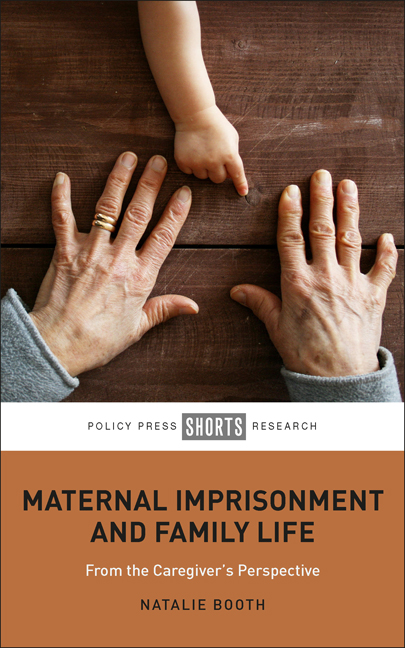Book contents
- Frontmatter
- Contents
- List of Tables
- Acknowledgements
- Preface: Linda’s Story
- One The Landscape of Maternal Imprisonment: Caregiving and Family Life
- Two Researching the Caregiver’S Lived Experiences
- Three Family Constructions and Caregiving Practices
- Four Renegotiating Family Life: Caregiving in the Aftermath of the Mother’S Imprisonment
- Five Navigating the Criminal Justice System
- Six Social Support, Familial Stigma and Release
- Seven Kin Caregiving: Occupying a Disenfranchised Status While Serving the Family Sentence
- Eight Reflections on the Research Process
- References
- Index
Two - Researching the Caregiver’S Lived Experiences
Published online by Cambridge University Press: 10 March 2021
- Frontmatter
- Contents
- List of Tables
- Acknowledgements
- Preface: Linda’s Story
- One The Landscape of Maternal Imprisonment: Caregiving and Family Life
- Two Researching the Caregiver’S Lived Experiences
- Three Family Constructions and Caregiving Practices
- Four Renegotiating Family Life: Caregiving in the Aftermath of the Mother’S Imprisonment
- Five Navigating the Criminal Justice System
- Six Social Support, Familial Stigma and Release
- Seven Kin Caregiving: Occupying a Disenfranchised Status While Serving the Family Sentence
- Eight Reflections on the Research Process
- References
- Index
Summary
Introduction
The aim of the research presented throughout this book was to explore how maternal imprisonment was experienced from a family-centred perspective. The intention was to provide an in-depth analysis of the experiences and perceptions of relatives looking after children whose mothers were in prison. To explain how this was achieved, this chapter is divided into three sections: the first section provides a description of the theoretical framework; the second section is an overview of the research methods adopted; and the third section introduces the caregiving kin and their familial circumstances. While this third section veers away from conventional academic norms, it does enable the participants’ lives and experiences to be foregrounded not only to enable the reader to become familiar with their family circumstances, but also to act as a point of reference, a reminder of the realities that they were negotiating.
Theoretical framework: ‘family practices’
Recent sociological conceptions of ‘the family’ emphasise the fluidity and active nature of ‘family practices’ by members of kin networks (Morgan, 1996, 1999, 2011), creating a useful lens with which to explore family life. ‘Family’ is characterised by interactions, roles and responsibilities that are negotiated and communicated, rather than normatively defined and static (Finch and Mason, 1993). As such, ‘individuals are doing family instead of simply passively residing within a pre-given structure’ (Silva and Smart, 1999: 5, emphasis original). This perspective helps to account for the more diverse forms of family life observed in contemporary society, including the alternative living arrangements of adults, with more cohabiting couples, single-occupancy households, re-partnering and ‘blended’ families, as well as the greater prominence of friendships (Williams, 2004). Although maternal imprisonment is not a new family formation, these changes in family construction will hold contextual and pragmatic significance for all forms of contemporary family research. For instance, as will be discussed later in this chapter, some caregiving kin interviewed in this study were friends of the family or in blended families (for example, two fathers interviewed were caring for both their biological and stepchildren).
- Type
- Chapter
- Information
- Maternal Imprisonment and Family LifeFrom the Caregiver's Perspective, pp. 19 - 40Publisher: Bristol University PressPrint publication year: 2020



